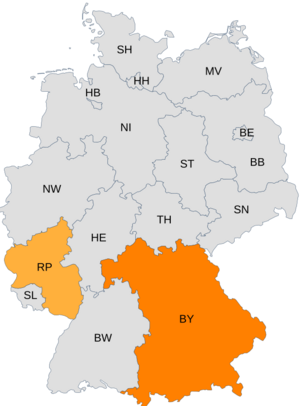Free Voters facts for kids
Quick facts for kids
Free Voters
Freie Wähler
|
|
|---|---|
 |
|
| Abbreviation | FW |
| Chairman | Hubert Aiwanger |
| Deputy Chairpersons | Manfred Petry Gabi Schmidt Gregor Voht Engin Eroglu Denise Wendt |
| Federal Managing Director | Arnold Hansen |
| Federal Treasurer | Christa Hudyma |
| Founded | 1965 (as Bundesverband) 24 January 2009 (as a party) |
| Headquarters | Mühlenstraße 13, Ganderkesee, Germany |
| Youth wing | Young Free Voters |
| Membership (2020) | 6,225 |
| Ideology | |
| Political position | Centre-right |
| European affiliation | European Democratic Party |
| European Parliament group | Renew Europe |
| Colours | Orange Azure |
| State parliaments |
38 / 1,889
|
| European Parliament |
2 / 96
|
The Free Voters (called Freie Wähler in German, or FW for short) is a political party that is considered centre-right. It started as a group of local associations called "Free Voters Associations" (Freie Wählergemeinschaften). These groups are made up of people who run in elections without being part of a big, registered political party.
These associations are usually organized at a local level, like a registered club. Most of the time, Free Voters only campaign for local government jobs, such as seats on city councils or for mayors. They are most successful in the countryside in southern Germany. They often appeal to conservative voters who prefer decisions to be made locally rather than by big political parties. Free Voter groups are active in all of Germany's states.
Contents
History of the Free Voters
The Free Voters have grown from local groups into a national party. They have had some important successes in elections.
Early Success in Bavaria
In the 2008 Bavaria state election, the Free Voters association did very well. They won 10.2% of the votes and got their first 20 seats in the Bavarian state parliament. The Free Voters of Bavaria have been running in state elections since 1998, which is different from other German states. In the state election of 2013, they continued their success, winning 19 seats.
Joining the European Parliament
In the 2014 European Parliament elections, the Free Voters won 1.46% of the national vote. This allowed them to send one person, Ulrike Müller, to the European Parliament. She joined a group there called the ALDE Group. Later, in October 2015, the national Free Voters association joined the European Democratic Party.
After the 2019 European Parliament election, the Free Voters now have two members in the European Parliament. They are part of the Renew Europe group.
Recent State Election Results
In the 2018 Bavarian state election, the Free Voters achieved their best result yet in Bavaria. They won 27 seats. This led to them joining the government in Bavaria as a junior partner with the CSU party.
More recently, in the 2021 Rhineland-Palatinate state election, the Free Voters entered the state parliament of Rhineland-Palatinate for the first time. They won 5.4% of the votes and six seats.
What the Free Voters Believe In
The Free Voters are generally a conservative party. Their main idea is to give more power to local communities. This is called devolution. They also disagree with some of the financial policies of the European Union.
People describe the Free Voters' political views in different ways. Some say they are between the Free Democratic Party and another party called the Party of Bible-abiding Christians. Others say they are between the Christian Social Union and the Alternative for Germany (AfD). Some experts describe them as a centrist party, meaning they are in the middle of the political spectrum. They are also seen as right-wing and conservative.
Free Voters in Elections
The Free Voters participate in elections at different levels in Germany.
Federal Elections
The Free Voters have run in federal elections, which are elections for the entire country. So far, they have not won any seats in the German national parliament, the Bundestag. Their support has been growing, but they haven't reached the level needed to get seats at the federal level.
State Parliament Elections
The Free Voters are active in many state elections across Germany. They do not run in Brandenburg because they work closely with another local group there.
They have been very successful in Bavaria, where they are part of the state government. They also have seats in the state parliament of Rhineland-Palatinate. In other states, they have run in elections but have not yet won enough votes to get seats in the state parliaments.
See also
 In Spanish: Freie Wähler para niños
In Spanish: Freie Wähler para niños
 | Jessica Watkins |
 | Robert Henry Lawrence Jr. |
 | Mae Jemison |
 | Sian Proctor |
 | Guion Bluford |


